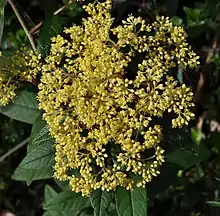| Lemon dogwood | |
|---|---|
 | |
| Pomaderris intermedia near Orbost | |
| Scientific classification | |
| Kingdom: | Plantae |
| Clade: | Tracheophytes |
| Clade: | Angiosperms |
| Clade: | Eudicots |
| Clade: | Rosids |
| Order: | Rosales |
| Family: | Rhamnaceae |
| Genus: | Pomaderris |
| Species: | P. intermedia |
| Binomial name | |
| Pomaderris intermedia | |
| Synonyms[1] | |
| |
Pomaderris intermedia, commonly known as lemon dogwood,[2] is a species of flowering plant in the family Rhamnaceae and is endemic to south-eastern Australia. It is a shrub with hairy stems, elliptic to egg-shaped leaves, and clusters of yellow flowers.
Description
Pomaderris intermedia is a shrub that typically grows to a height of up to about 3 m (9.8 ft), its branchlets covered with both simple and star-shaped hairs. The leaves are broadly elliptic to narrowly egg-shaped, 30–100 mm (1.2–3.9 in) long and 10–50 mm (0.39–1.97 in) wide with stipules 3–8 mm (0.12–0.31 in) long at the base but that fall off as the leaf develops. The upper surface of the leaves is glabrous and the lower surface covered with greyish, star-shaped hairs. The flowers are yellow and arranged in pyramid-shaped to hemispherical panicles 40–150 mm (1.6–5.9 in) long, each flower on a pedicel 2–5 mm (0.079–0.197 in) long with bracts at the base but that fall off as the flower opens. The floral cup is 1.0–1.5 mm (0.039–0.059 in) long, the sepals 2–3 mm (0.079–0.118 in) long but fall off as the flowers open, and the petals are spatula-shaped and 2.0–2.5 mm (0.079–0.098 in) long. Flowering occurs in September and October.[3][4][5]
Taxonomy
Pomaderris intermedia was first formally described in 1825 by Augustin Pyramus de Candolle in Prodromus Systematis Naturalis Regni Vegetabilis from an unpublished description by Franz Sieber.[6][7] The specific epithet (intermedia) refers to a close association with two other Pomaderris species.[8]
Distribution and habitat
Lemon dogwood grows in forest, woodland and heath, and is found from south from the Gibraltar Range National Park in New South Wales to Western Port and French Island in Victoria, and in scattered locations in Tamania, including on some Bass Strait islands.[2][3][4][5]
Conservation status
This pomaderris is listed as "rare" under the Tasmanian Government Threatened Species Protection Act 1995.
References
- 1 2 "Pomaderris intermedia". Australian Plant Census. Retrieved 2 March 2022.
- 1 2 "Threatened Species Link - Pomaderris imtermedia". Tasmanian Government Department of Primary Industries, Parks, Water and the Environment. Retrieved 2 March 2022.
- 1 2 Harden, Gwen J. "Pomaderris intermedia". Royal Botanic Garden Sydney. Retrieved 11 February 2022.
- 1 2 Walsh, Neville G. "Pomaderris intermedia". Royal Botanic Gardens Victoria. Retrieved 2 March 2022.
- 1 2 Wood, Betty. "Pomaderris intermedia". Lucid Keys. Retrieved 2 March 2022.
- ↑ "Pomaderris intermedia". Australian Plant Name Index. Retrieved 2 March 2022.
- ↑ de Candolle, Augustin P.; de Candolle, Alphonse (1825). Prodromus systematis naturalis regni vegetabilis. Vol. 2. Paris. p. 33. Retrieved 2 March 2022.
- ↑ Owens, Lorraine. "Pomaddrris intermedia". Australian National Botanic Gardens. Retrieved 2 March 2022.